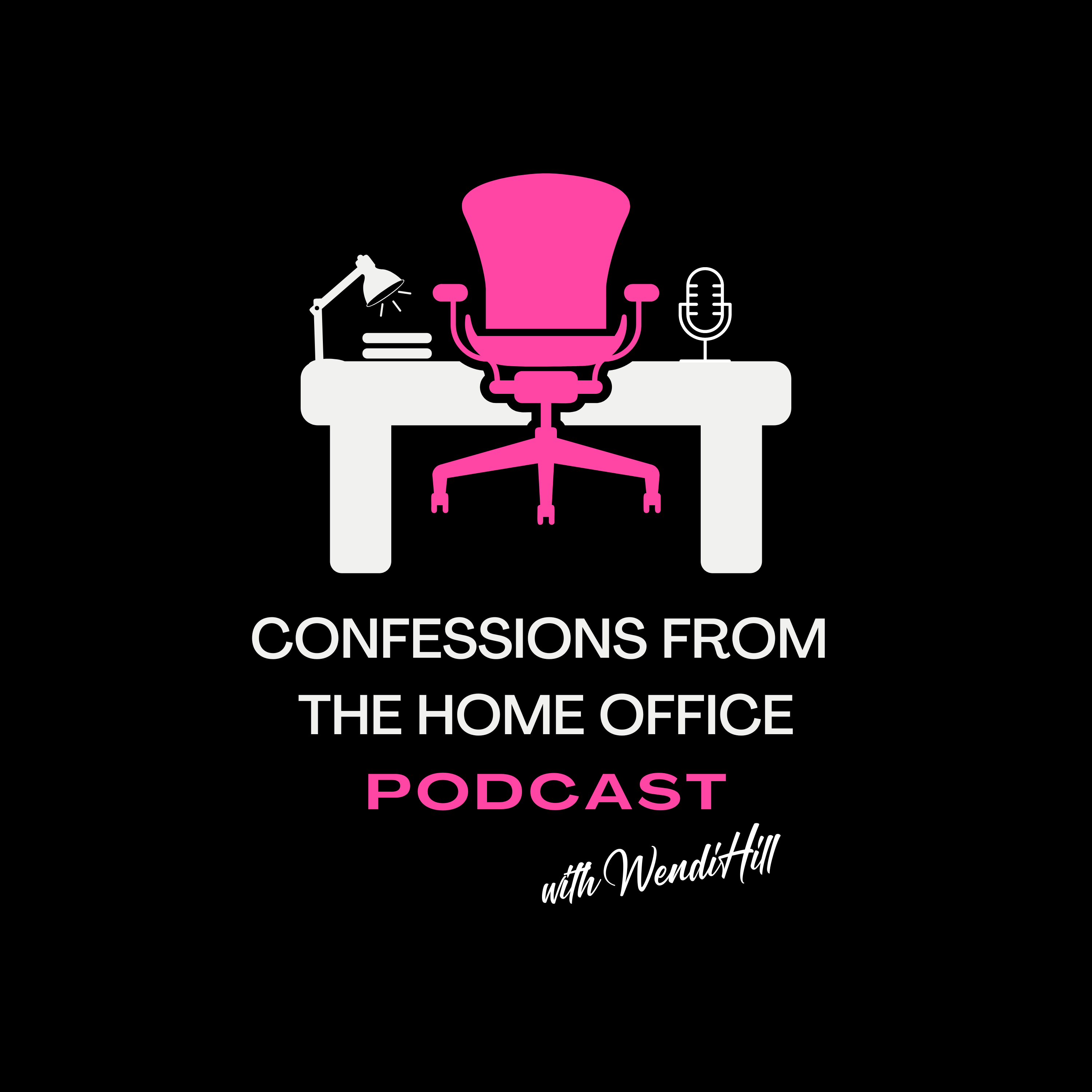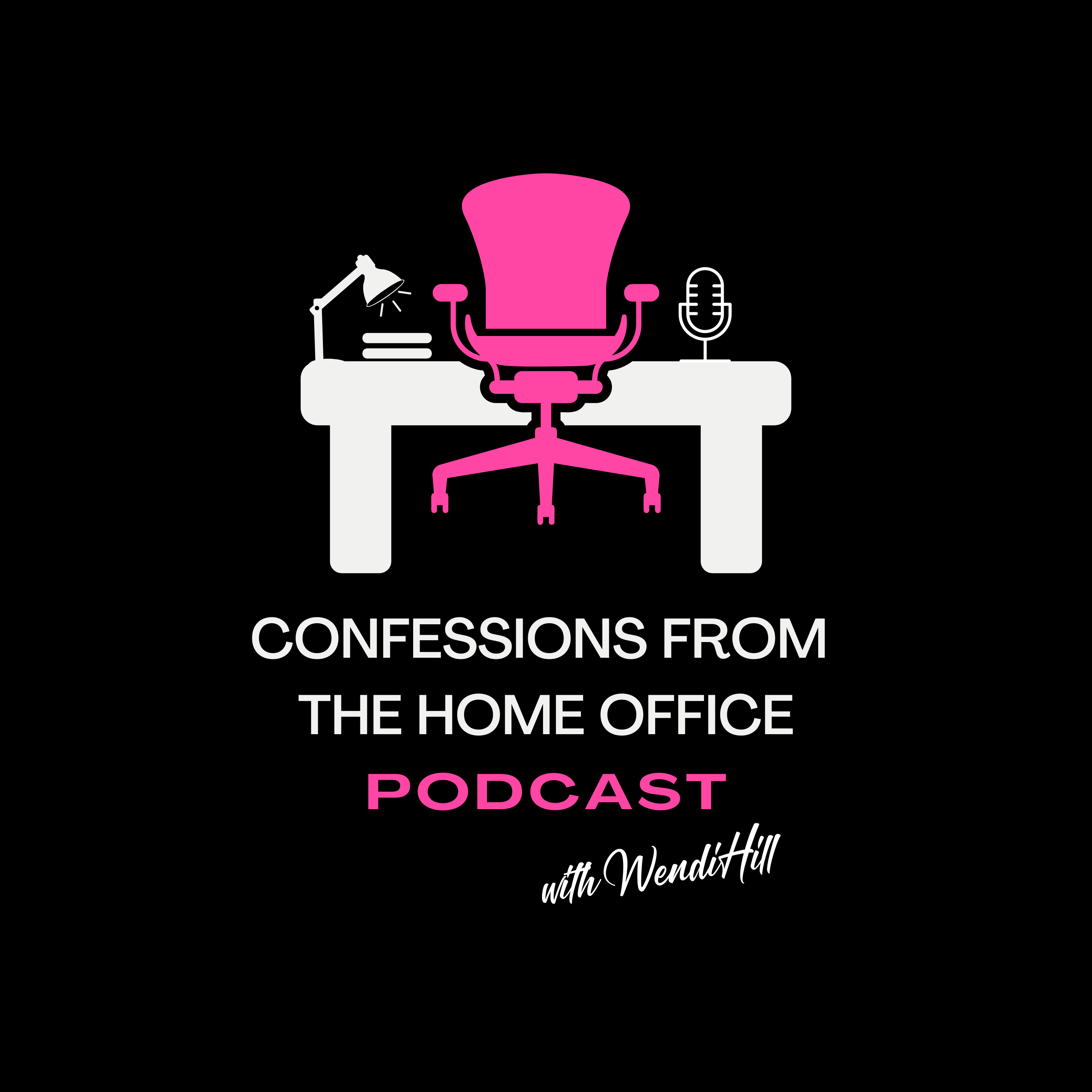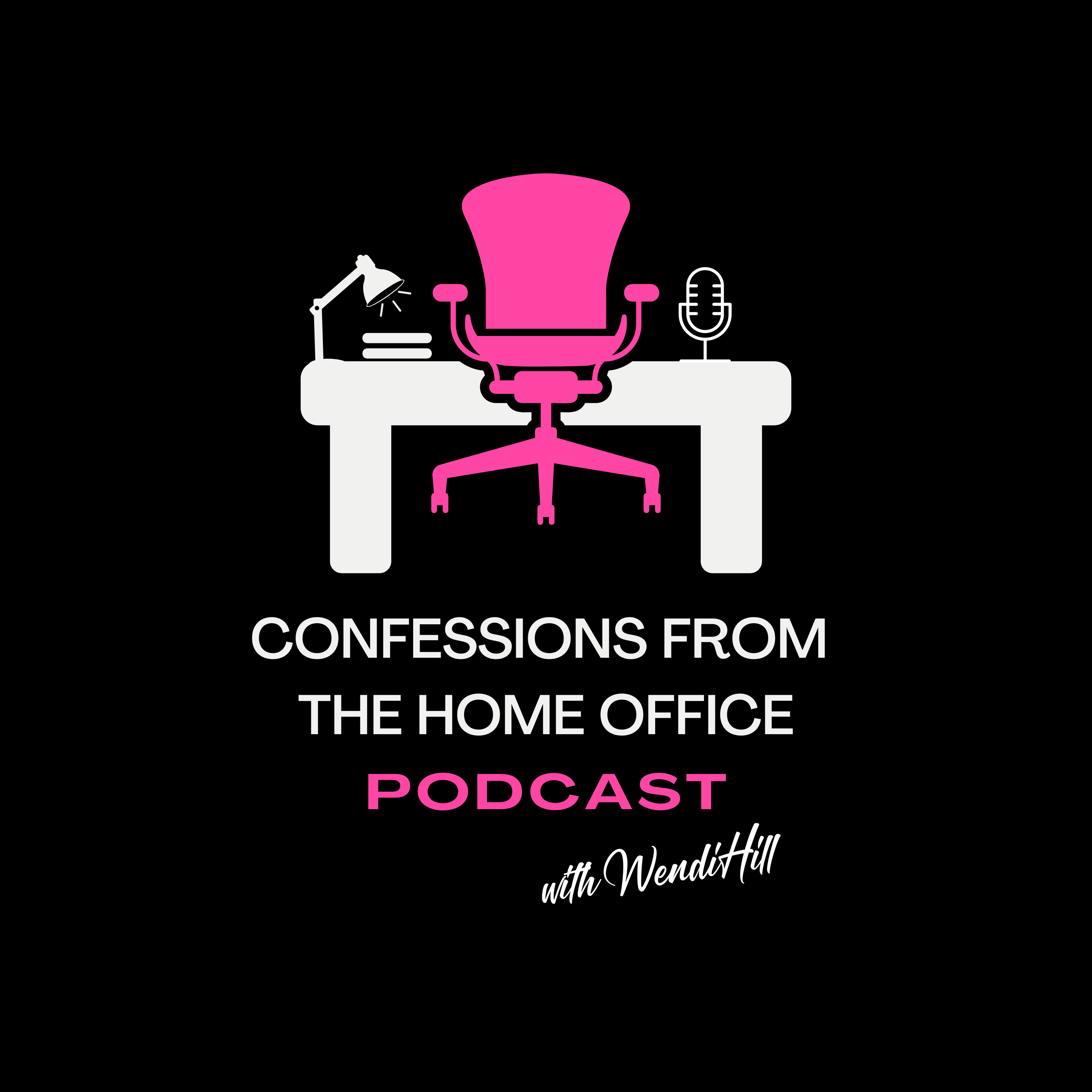Episode Transcript
[00:00:00] Foreign.
[00:00:06] Hi, there. Welcome back to the Confessions in the Home Office podcast. I'm Wendy Hill, and each week I'm talking about something related to running a business from home, whether it's in your home office, your square bedroom, your kitchen table, or, let's face it, sometimes it's in the car in the Target parking lot waiting on a curbside pickup.
[00:00:26] So today I'm going to talk about a mindset trap I see all the time and that I've fallen into more times than I'd like to admit.
[00:00:34] And it's called obsessing over your competition.
[00:00:38] So we all know how it goes. You see someone else's Instagram post, you see their new website, you hear about some new service they're offering or some package they put together, and suddenly you're kind of going down the rabbit hole. You're spiraling. Should I be doing that?
[00:00:54] Am I behind? Why have I done. Why have I not done anything new in a while?
[00:00:58] Maybe I need to completely redo my strategy. Maybe I need to rethink everything. Maybe I just need a new website. Maybe I just need to spend this weekend retooling some things.
[00:01:08] Don't any of those things sound familiar? So here's the thing. Your competition, they don't pay your bills. Your clients pay your bills. So why do we give so much time to these people who a lot of times, they don't even know who we are, and they're not serving the people we're serving, and we should be doubling down on the people that we are serving.
[00:01:29] So that's what we're talking about today. While watching your competition too closely can really wreck the momentum of your business, how to break the comparison cycle, and what to focus on instead if you want your business to really grow.
[00:01:44] So now we'll call this next part of the podcast the Confession. When I became a competition stalker.
[00:01:49] So there was a season in my business, and it went on a lot longer than I would like to admit, where I spent a fair amount of time looking at what other people were doing rather than focusing on what I was doing. I was serving clients. People were still paying their bills. They were getting results. I was showing up to meetings, but I was. There's another episode I have about being a course junkie, spying all kinds of courses and watching all these webinars. And I do do a lot of that, but it was just.
[00:02:17] It was out of control.
[00:02:19] So every day and then sometimes on the weekends, instead of checking in with clients or following up on things, things were getting done. But instead of communicating that. I was on Instagram scrolling through the feeds of people looking through LinkedIn. What are, what are people doing? Making mental notes.
[00:02:35] Look at this group program. Maybe I should be doing that.
[00:02:39] This person's using reels every day now. Maybe I should be doing that.
[00:02:43] They just rebranded. I like the colors of their logo. Maybe I should do that.
[00:02:48] I was calling it research and trying to keep up with things. But let's be real, it was competition, stalking, it was procrastination, it was all kinds of things.
[00:02:59] So the more I compared, the worse that I felt. Instead of feeling inspired and like I had creative energy flowing, I was just scattered.
[00:03:10] Instead of creating things, I was thinking about copying things.
[00:03:15] But that's not helping my clients. And instead of moving forward, I was just second guessing everything that I did.
[00:03:23] So here's the deal. My clients do not care what my competitors are doing. They care about if I'm showing up, if I'm delivering, serving them, and they're seeing results.
[00:03:35] Now here's why I think we get so obsessed with competitors. When you're running your own business, there's no real report card. No boss giving you feedback, no performance review, no Monday morning meeting where everybody can talk. Now, you may be doing that with your team, but as a boss, you're not getting a lot of that feedback in people pushing you and questioning things and reassuring you that things are going well.
[00:04:00] So we really start looking sideways to measure ourselves.
[00:04:04] If someone else, someone else is launching, maybe I should be doing that. If they're on TikTok, maybe they need to be there. Don't get me started on TikTok. If they're raising prices, maybe I should raise my prices too. But wait, is that going to make anybody mad? So as a business owner, you know this talk, you know these cycles, you know this head trash that goes on all the time. So you may feel like things are productive when we're staying on top of trends, but in reality we're just feeding that beast of self doubt.
[00:04:34] So there's a cost of competitor obsession. When you focus too much on them, you lose your unique voice. You start sounding like everybody else because you're borrowing their strategies and their language instead of owning your own.
[00:04:50] You're wasting energy. This is energy that could be spent creating content, figuring out new ways to keep your clients, clients up to date, serving them, building out systems.
[00:05:01] Because you're just wasting that time on comparison. You're going to feel it, you're going to be frustrated, you're going to be overly tired before the end of the day, you're going to be fantasizing about the weekend by Wednesday. But wait, sometimes we always do that.
[00:05:14] So another sign is you change direction constantly, which means people don't really know what you're doing. Oh, you have a new offer. Oh, here's another offer. Oh, now they're doing this.
[00:05:24] One week you're offering a course. Next you're promoting new one on one. Now you're thinking about doing a membership. Maybe you're thinking about starting something totally new.
[00:05:34] And now you need equipment and an editor and all those things. And then people don't know what you stand for or you forget who actually matters. Your clients don't care if your competitor just posted a reel that got 10,000 views.
[00:05:50] They care whether you answer their email or get on the zoom call at the right time and that you're not late.
[00:05:57] And they care about whether your service deliver gives them results.
[00:06:03] So here's the harsh truth. Your competition isn't paying your bills. Your clients are. So why are you working so hard to impress the wrong people?
[00:06:13] So here's what I started doing when I realized competitor watching was draining the life out of me. And it really was number one, put yourself on a competitor diet. Don't laugh, but stop scrolling feeds. Unfollow some people if you need to.
[00:06:29] About once a month, I'll go out and read some newsletters to figure out trends and I'll look at the actual platforms that I use. I subscribe to some industry newsletters and some YouTube channels and things will pop up here and there that you need to look at right away. But I'm not trying to stay on top of every single thing constantly, in real time. You just can't do it. Your brain. I feel like some days my brain was going to short circuit.
[00:06:57] So the next thing is to redirect the industry.
[00:06:59] I can't talk today. Redirect the energy.
[00:07:02] When I catch myself wondering what others are doing, I try to kind of flip it around and think, what do my clients need from me today?
[00:07:10] How can I make their marketing better? The last time we were in a meeting together, they talked about X, Y and Z.
[00:07:18] So if I have the answers, it's about reframing my thoughts. That shift has led to better ideas than anything that I could ever have stolen from somebody else's social media.
[00:07:30] And the next is build your own scorecard. Instead of figuring out trying to measure yourself against what other people are doing. I track client results, repeat business revenue, stability, and my own energy levels. How. How am I feeling?
[00:07:46] And I know we have to think about personal life and things going on with family and things like that, but how do I feel about the business?
[00:07:54] Do I dread it?
[00:07:57] Am I energized? Am I just going through the motions?
[00:08:01] So you need to think about that and repeat. Business and revenue stability are so important, along with client results, of course. But you don't want to have to keep churning and keep finding new business because people are leaving as fast as they're coming in.
[00:08:17] Long term stability is what you're going for.
[00:08:22] So looking at those things tell me way more about my business than someone else's quick launch.
[00:08:28] And also, you've just got to stay focused on your lane.
[00:08:32] You need to pick on, pick one or two things that you're good at, market those, keep refining those. Market those. Don't have 15 things you offer.
[00:08:41] That's how momentum builds. It's not by changing direction every five minutes. The shiny object syndrome. Just because you saw someone's new sales page or you participated in a brainstorming group on Zoom, and now you have all these new ideas, you've got to stay the course.
[00:08:59] So here's the truth. If you want to grow your business, don't obsess over competitors. I want you to obsess over your clients.
[00:09:07] And I want you to ask yourself, how can I make the client experience smoother for them?
[00:09:11] How can I surprise them in small ways, Maybe not every week, but kind of sporadically, maybe when they're not expecting it and is there any way I can help them get results faster? And if so, do it.
[00:09:24] A happy client tells their colleagues and tells their friends. A happy client comes back. A happy client pays the bills.
[00:09:32] The most exciting thing I ever get in my email, besides proposal signed see attached, is Wendy. I would like to introduce you to John Smith.
[00:09:44] John, I've been working with Wendy for four years.
[00:09:48] We have a great relationship. She's done great work. I think she could really help your business. You two take it from here.
[00:09:55] That is the best email you can get your competitors. They don't do that for you.
[00:10:02] And here's one thing, and this is kind of just another side note, I would take that client experience and the thing that works really well and the thing that results in that kind of email from a client introducing you to someone else and map it out in a project management system as a template.
[00:10:17] I'm a Trello person. I think I talk about that almost every week.
[00:10:22] You can get a free version of Trello, but if you can map out the process and think through Everything you've been doing for that client that has made them happy, has given them great results and has made your life easier.
[00:10:34] Get the steps down, get it all figured out, and that way you can replicate it and tweak it, of course, because every client's different. But I think that's a huge weight off your shoulders to get things out of your head and into a system.
[00:10:47] So here's my challenge to you this week. I want you to take a break from watching competitors.
[00:10:53] I want you to log out, mute them, whatever you have to do, and instead spend that same energy serving your clients or improving your systems because your competition isn't paying your bills, your clients are. And the more you focus on them, the faster your business is going to grow.
[00:11:12] So if this hit home, I'd love to hear about your own confession. Have you ever gone down the competitor stalking rabbit hole?
[00:11:19] Send me a message, email me, tag me in a story and we can laugh about it together.
[00:11:24] So if you found this episode helpful, don't forget to follow the show so you never miss a new one.
[00:11:30] And that's all for this week.
[00:11:32] So I hope that some of you, some of you identified with this and maybe you'll think about things before you get on and start scrolling in the mornings and get yourself stressed out.
[00:11:43] And I'll be back next week with another episode of Confessions in the Home Office. Thank you. Thanks.


